Hilton Worldwide Holdings Bundle
Can Hilton Worldwide Holdings Continue Its Reign in the Hospitality Industry?
In the ever-evolving landscape of the hotel industry, understanding a company's growth strategy is crucial for investors and industry observers alike. Hilton Worldwide Holdings, a titan in the global hospitality market, has a rich history dating back to 1919, evolving from a single hotel to a vast network of over 7,600 properties worldwide. This article delves into the Hilton Worldwide Holdings SWOT Analysis, exploring its strategic initiatives and future prospects.
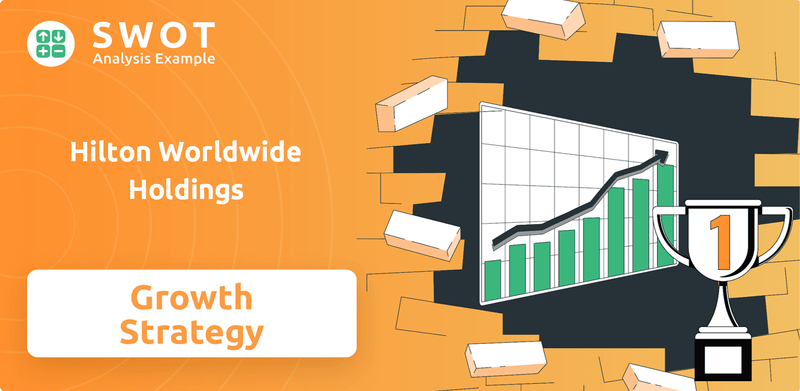
Hilton's journey reflects a commitment to innovation and adaptability, essential for navigating hospitality market trends. This analysis will explore Hilton's expansion plans in Asia, its digital transformation strategy, and its strategic partnerships. We'll examine Hilton's financial performance, competitive advantages, and long-term business goals, providing actionable insights into its potential for continued success and its impact on local economies. Furthermore, this analysis will touch upon Hilton's strategies for customer satisfaction and its response to market challenges, offering a comprehensive view of Hilton's future prospects.
How Is Hilton Worldwide Holdings Expanding Its Reach?
The Hilton growth strategy is heavily focused on expanding its global footprint and diversifying its brand portfolio to meet evolving traveler needs. As of the first quarter of 2024, the company's development pipeline reached a record-breaking 473,000 rooms, a clear indicator of its ambitious expansion plans.
A significant portion of this growth is targeted internationally, with approximately 60% of the pipeline located outside the United States. This strategic move underscores Hilton Worldwide Holdings' commitment to capturing opportunities in high-growth markets like Asia Pacific and Europe, the Middle East, and Africa (EMEA).
This expansion is supported by the introduction of new brands and strategic partnerships, allowing it to cater to a wider range of customer preferences and market segments. To learn more about their marketing approach, check out the Marketing Strategy of Hilton Worldwide Holdings.
Hilton is prioritizing expansion in international markets, particularly in the Asia Pacific region, including China, and Europe, the Middle East, and Africa (EMEA). This strategy aims to capitalize on the growing demand for hospitality services in these areas. The company's focus on global growth is evident in its development pipeline, with a majority of new rooms planned outside the U.S.
Hilton is introducing new brands to target emerging market segments and cater to changing traveler preferences. Spark by Hilton, an economy extended-stay brand, was launched in 2024 to address the demand for affordable, long-term accommodations. Other brands like Tempo by Hilton and Motto by Hilton are aimed at modern travelers seeking unique experiences.
Hilton is leveraging strategic partnerships and conversions of existing properties to expand its footprint efficiently. Conversions accounted for 24% of new room openings in 2023, demonstrating a cost-effective growth strategy. The company also focuses on enhancing existing properties through renovations and technology upgrades to improve the guest experience.
Hilton aims for a 5% to 6% net unit growth in 2024, which translates to approximately 65,000 to 70,000 net new rooms. This aggressive growth plan reflects the company's confidence in the hotel industry analysis and its ability to capitalize on hospitality market trends. The company is focused on achieving its Hilton future prospects through strategic investments and expansion initiatives.
Hilton's expansion strategy encompasses international growth, new brand launches, strategic partnerships, and property conversions. These initiatives are designed to increase market share, enhance customer satisfaction, and drive revenue growth.
- Focus on Asia Pacific and EMEA for international growth.
- Launch of new brands like Spark by Hilton to capture new market segments.
- Strategic partnerships and conversions to expand the footprint.
- Investment in technology and renovations to enhance guest experience.
Hilton Worldwide Holdings SWOT Analysis
- Complete SWOT Breakdown
- Fully Customizable
- Editable in Excel & Word
- Professional Formatting
- Investor-Ready Format
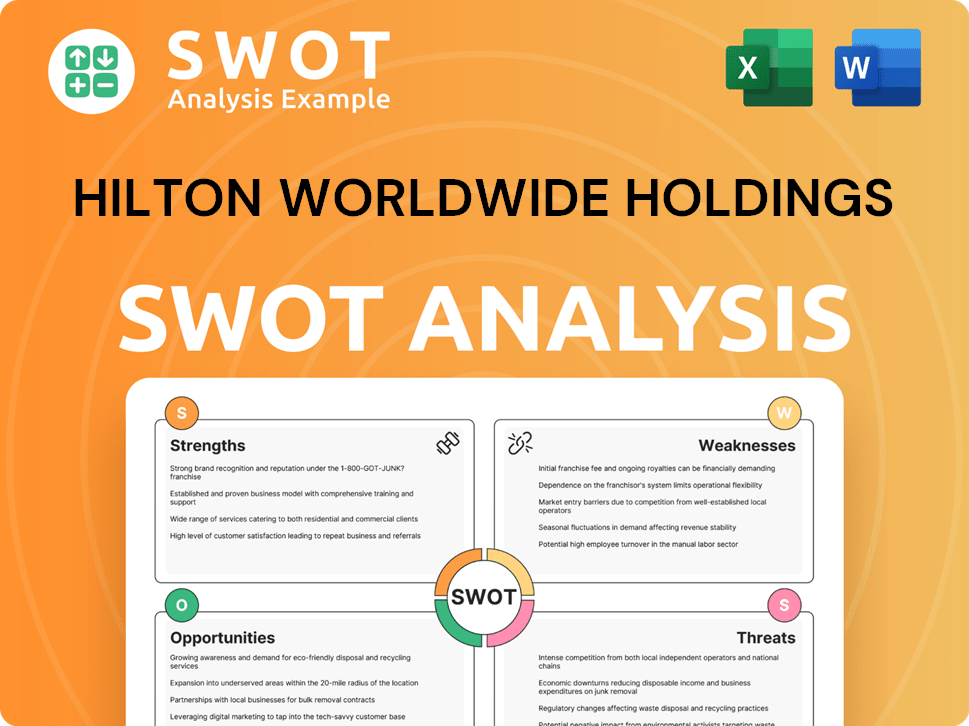
How Does Hilton Worldwide Holdings Invest in Innovation?
The focus on innovation and technology is central to the Hilton growth strategy. This strategy aims to improve guest experiences, streamline operations, and promote sustainable growth. Through digital transformation and the integration of cutting-edge technologies, the company seeks to maintain its competitive edge in the dynamic hotel industry analysis.
Hilton Worldwide Holdings is actively investing in digital platforms to create seamless and intuitive customer journeys, from booking to post-stay engagement. The company's commitment to sustainability, coupled with its technological advancements, positions it well to meet evolving hospitality market trends and achieve its long-term business goals.
The company is exploring ways to leverage artificial intelligence (AI) and the Internet of Things (IoT). AI-powered analytics help predict guest preferences, allowing for tailored recommendations. IoT devices contribute to smart room functionalities and energy management, leading to operational efficiencies and a more comfortable stay for guests.
The Hilton's digital transformation strategy focuses on mobile-first solutions and personalized services. The Hilton Honors app offers features like digital check-in, room selection, and digital key access. This enhances convenience and efficiency for guests.
Hilton's investment in technology includes exploring AI and IoT. AI personalizes guest stays and optimizes hotel operations. IoT devices enhance smart room functionalities and energy management.
Sustainability is a key part of Hilton's sustainability initiatives. The company has set ambitious environmental goals. Hilton's 'LightStay' platform measures and analyzes environmental impact.
Hilton's investment in technology includes connected room technology. Guests can control room features via mobile devices or in-room tablets. This enhances guest experience.
Hilton's long-term business goals include significant ESG targets. The company aims to reduce carbon emissions intensity. These efforts align with its growth objectives.
Hilton's competitive advantages are enhanced through technology. Smart room features and energy management improve operational efficiency. This leads to cost savings and resilience.
Hilton's future prospects are significantly influenced by its technological advancements and sustainability efforts. The company's focus on innovation not only improves the guest experience but also enhances operational efficiency and supports its environmental goals. This strategic approach is vital for long-term success in the competitive hospitality market.
- Digital Guest Experience: The Hilton Honors app provides a seamless experience, offering digital check-in, room selection, and digital key access.
- AI and IoT Integration: AI is used to personalize guest stays and optimize hotel operations, while IoT enhances smart room functionalities and energy management.
- Sustainability Targets: Hilton aims to reduce carbon emissions intensity by 75% in managed hotels and 56% in franchised hotels by 2030 compared to 2019 levels.
- LightStay Platform: This proprietary system measures and analyzes environmental and social impact, helping properties track and improve sustainability performance.
- Connected Room Technology: Guests can control room features like lighting and temperature through their mobile devices or in-room tablets.
For more information on the financial performance of Hilton, you can refer to Owners & Shareholders of Hilton Worldwide Holdings.
Hilton Worldwide Holdings PESTLE Analysis
- Covers All 6 PESTLE Categories
- No Research Needed – Save Hours of Work
- Built by Experts, Trusted by Consultants
- Instant Download, Ready to Use
- 100% Editable, Fully Customizable
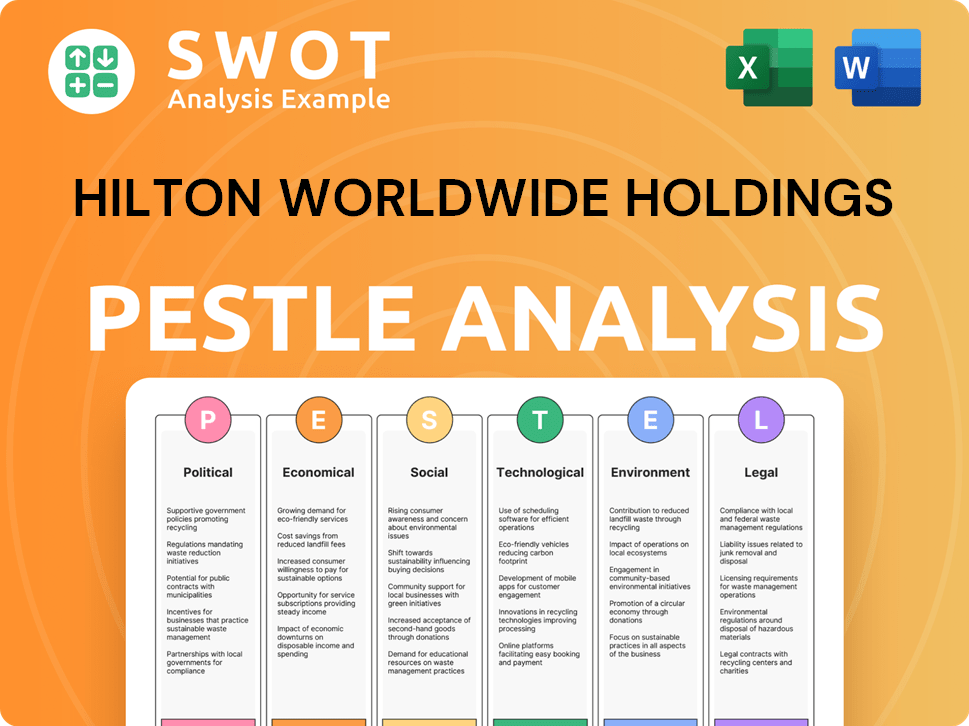
What Is Hilton Worldwide Holdings’s Growth Forecast?
The financial outlook for Hilton Worldwide Holdings is positive, with projections indicating continued growth and strong performance. The company's strategic initiatives and robust financial management are expected to drive sustained profitability. This positive trajectory is supported by strong demand in both the leisure and business travel segments, as well as an asset-light business model.
For the full year 2024, Hilton anticipates diluted EPS between $6.86 and $7.06. Comparable system-wide RevPAR growth is projected to be between 2% and 4% on a comparable currency basis. Adjusted EBITDA is expected to range from $3,370 million to $3,450 million. These figures reflect a healthy financial outlook, supported by the company's strategic initiatives and strong market position.
In the first quarter of 2024, Hilton demonstrated strong financial performance. Diluted EPS was reported at $1.04, and adjusted EBITDA reached $750 million. System-wide RevPAR increased by 2.0% compared to the same period in 2023. Management and franchise fee revenues saw a 6% increase in Q1 2024, reaching $606 million, highlighting the strength of its asset-light model. The company continues to return capital to shareholders, with $621 million returned through share repurchases and dividends in Q1 2024, and an additional $3 billion authorized for share repurchases, signaling confidence in future financial performance. To understand more about the company's customer base, you can read about the Target Market of Hilton Worldwide Holdings.
Hilton is actively expanding its presence in the Asia-Pacific region, focusing on key markets like China and Southeast Asia. This expansion is part of its broader strategy to capitalize on the growing travel and tourism sectors in these areas. The company's development pipeline includes a significant number of rooms in the Asia-Pacific region, driving future growth.
Hilton is committed to sustainability, implementing various initiatives to reduce its environmental impact. These include energy efficiency programs, waste reduction strategies, and sustainable sourcing practices. The company aims to integrate sustainability into its operations to meet the growing demand for eco-friendly travel options. These initiatives are part of Hilton's long-term business goals.
Hilton is investing heavily in technology to enhance the guest experience and streamline operations. This includes improvements to its mobile app, online booking platforms, and digital key technology. These digital initiatives are designed to improve customer satisfaction and drive operational efficiency. The company is focused on Hilton's investment in technology.
Hilton benefits from several competitive advantages, including its strong brand portfolio, global presence, and loyalty program. The company's asset-light business model allows for rapid expansion and higher profit margins. These advantages contribute to Hilton's market share analysis and overall success in the hotel industry.
Hilton's revenue growth is driven by several factors, including RevPAR growth, expansion of its hotel portfolio, and increased management and franchise fees. The company's strong brand recognition and customer loyalty also contribute to revenue growth. These factors are essential for Hilton's future prospects.
- System-wide RevPAR growth.
- Expansion of the hotel portfolio.
- Increased management and franchise fees.
- Strong brand recognition and customer loyalty.
Hilton Worldwide Holdings Business Model Canvas
- Complete 9-Block Business Model Canvas
- Effortlessly Communicate Your Business Strategy
- Investor-Ready BMC Format
- 100% Editable and Customizable
- Clear and Structured Layout
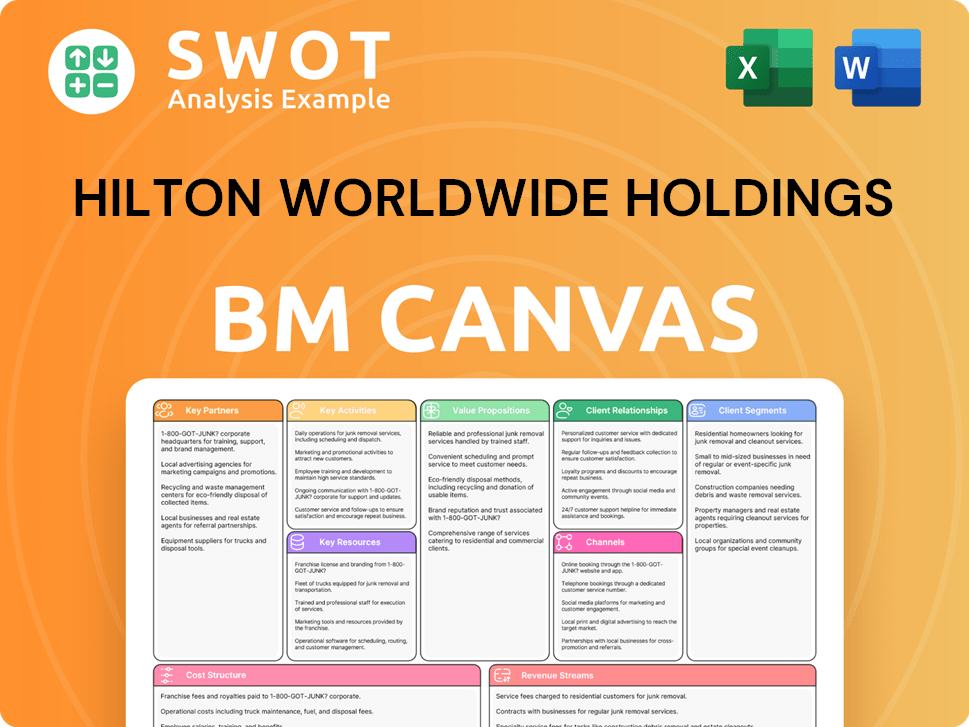
What Risks Could Slow Hilton Worldwide Holdings’s Growth?
The path of Hilton Worldwide Holdings towards future growth isn't without its hurdles. Several potential risks and obstacles could influence the company's performance. Understanding these challenges is crucial for investors and stakeholders to assess the long-term viability of Hilton's growth strategy.
One of the primary concerns is the highly competitive nature of the hospitality industry. With numerous global chains, independent hotels, and alternative accommodation providers, maintaining market share and profitability demands constant innovation and differentiation. Furthermore, external factors such as regulatory changes, geopolitical instability, and technological disruptions pose significant challenges that Hilton Worldwide Holdings must navigate to ensure sustained success.
Hilton's future prospects are also subject to the impact of economic downturns and recessions in key markets, which could lead to decreased travel demand and negatively affect revenue. The company must proactively manage these risks through strategic planning, diversified brand portfolios, and robust risk management frameworks.
The hospitality market is intensely competitive, with numerous global chains and independent hotels vying for market share. Hilton faces pressure to differentiate its brands and offerings to maintain its competitive edge and occupancy rates. The rise of alternative accommodation providers like Airbnb adds further complexity to the competitive landscape.
Changes in travel policies, visa requirements, or local taxation can significantly affect international travel, impacting hotel demand. Geopolitical events, such as conflicts or trade disputes, can deter travelers and disrupt operations. Economic downturns in key markets can also lead to reduced travel.
Advancements in AI, virtual reality, and digital services require continuous investment and adaptation to meet evolving guest expectations. Failure to keep pace with technological innovations could diminish the guest experience and reduce market relevance. Cybersecurity threats, including data breaches, pose a significant risk to reputation and finances.
Economic downturns or recessions in key markets can lead to reduced business and leisure travel, impacting RevPAR and overall revenue. Hilton must be prepared to adjust its strategies to mitigate the effects of economic volatility. The company needs to focus on cost management and operational efficiency during economic downturns.
Cybersecurity threats are a critical concern, as data breaches can severely damage the company's reputation and lead to significant financial and legal repercussions. Hilton must invest in robust cybersecurity measures to protect guest data and maintain operational integrity. The cost of data breaches and associated legal fees can be substantial.
Maintaining consistent service quality and operational efficiency across a global portfolio of hotels presents a significant challenge. Supply chain disruptions, labor shortages, and rising operational costs can impact profitability. Hilton needs to streamline operations and manage costs effectively.
To mitigate these risks, Hilton employs diversified brand portfolios, robust risk management frameworks, and continuous monitoring of market trends and geopolitical developments. The company focuses on strategic partnerships and technological innovation to enhance guest experiences and operational efficiency. Hilton invests in its loyalty program to build customer loyalty and drive repeat business.
Hospitality market trends, such as the rise of bleisure travel and increasing demand for sustainable practices, influence Hilton's strategies. The company is adapting to these trends through new brand offerings and sustainability initiatives. Hilton's ability to capitalize on these trends is crucial for future growth. For example, in Q1 2024, the company reported an increase in system-wide RevPAR by 4.9% compared to Q1 2023, showing resilience despite market challenges.
Hilton's financial performance is closely tied to its ability to navigate these risks effectively. In 2023, Hilton reported a strong performance, with a significant increase in revenue. However, the company faces challenges related to rising labor costs and potential economic slowdowns. The company's success will depend on its ability to maintain profitability while expanding its global footprint. For the full year 2023, Hilton reported a net income of $1.6 billion.
Hilton's long-term business goals include expanding its brand portfolio, increasing its presence in key markets, and enhancing its digital capabilities. The company is focused on strategic partnerships and investments in technology to improve guest experiences and operational efficiency. Hilton aims to achieve sustainable growth by adapting to market challenges and capitalizing on emerging opportunities. To learn more about Hilton's core values, you can read about the Mission, Vision & Core Values of Hilton Worldwide Holdings.
Hilton Worldwide Holdings Porter's Five Forces Analysis
- Covers All 5 Competitive Forces in Detail
- Structured for Consultants, Students, and Founders
- 100% Editable in Microsoft Word & Excel
- Instant Digital Download – Use Immediately
- Compatible with Mac & PC – Fully Unlocked
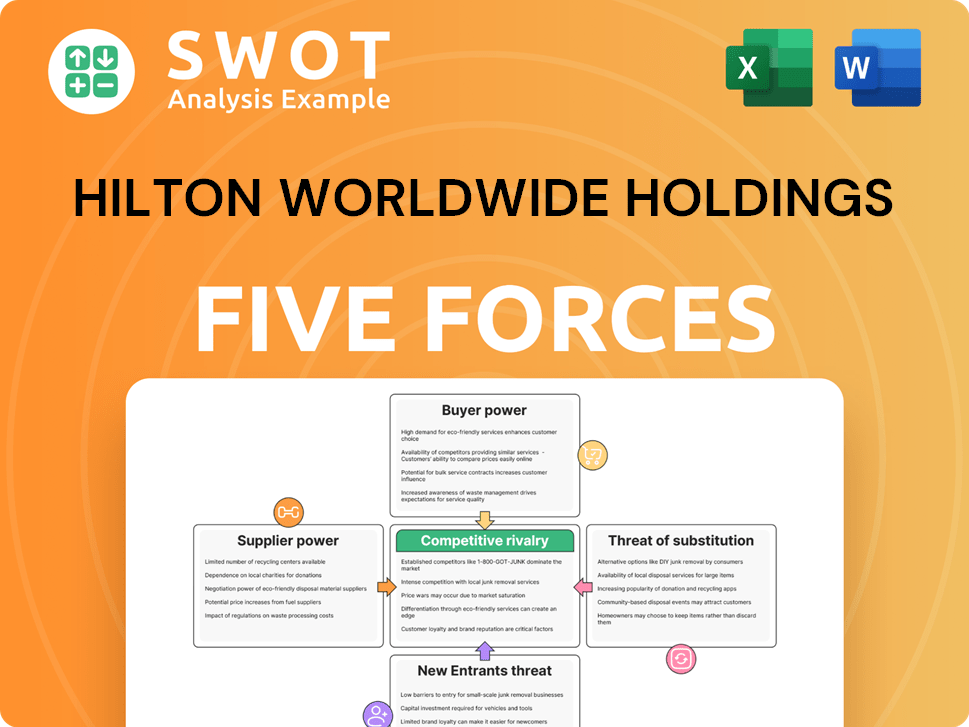
Related Blogs
- What are Mission Vision & Core Values of Hilton Worldwide Holdings Company?
- What is Competitive Landscape of Hilton Worldwide Holdings Company?
- How Does Hilton Worldwide Holdings Company Work?
- What is Sales and Marketing Strategy of Hilton Worldwide Holdings Company?
- What is Brief History of Hilton Worldwide Holdings Company?
- Who Owns Hilton Worldwide Holdings Company?
- What is Customer Demographics and Target Market of Hilton Worldwide Holdings Company?
Disclaimer
All information, articles, and product details provided on this website are for general informational and educational purposes only. We do not claim any ownership over, nor do we intend to infringe upon, any trademarks, copyrights, logos, brand names, or other intellectual property mentioned or depicted on this site. Such intellectual property remains the property of its respective owners, and any references here are made solely for identification or informational purposes, without implying any affiliation, endorsement, or partnership.
We make no representations or warranties, express or implied, regarding the accuracy, completeness, or suitability of any content or products presented. Nothing on this website should be construed as legal, tax, investment, financial, medical, or other professional advice. In addition, no part of this site—including articles or product references—constitutes a solicitation, recommendation, endorsement, advertisement, or offer to buy or sell any securities, franchises, or other financial instruments, particularly in jurisdictions where such activity would be unlawful.
All content is of a general nature and may not address the specific circumstances of any individual or entity. It is not a substitute for professional advice or services. Any actions you take based on the information provided here are strictly at your own risk. You accept full responsibility for any decisions or outcomes arising from your use of this website and agree to release us from any liability in connection with your use of, or reliance upon, the content or products found herein.